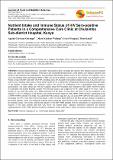Nutrient Intake and Immune Status of HIV Sero-positive Patients in a Comprehensive Care Clinic at Chulaimbo Sub-district Hospital, Kenya
Publication Date
2015Author
Agatha Christine Onyango, Mary Khakoni Walingo, Grace Mbagaya, Rose Kakai Publication date 2015
Metadata
Show full item recordAbstract/
Human immunodeficiency virus (HIV) and nutrition status of human are linked to HIV infection and poor nutrient
intake can speed the disease progress. Both macro-and micronutrient deficiencies could impair host immune functions and
promote viral replication and pathogenicity, thus potentially affecting the clinical course of HIV infection. The objective was to
assess the immune status and nutrient intake of HIV sero-positive patients. A prospective cohort study was conducted on 497
People Living with HIV and AIDS (PLWHA) attending clinic at Chulaimbo Sub-district hospital in Kenya. CD4 cell count was
used to assess immune status and a 24-hour dietary recall survey to capture the average macronutrient and micronutrient intake
of the patients. Nutrient intake was estimated using a diet history in combination with a standardized food frequency
questionnaire. The study setting was with the Academic Model for Prevention and Treatment of HIV/AIDS (AMPATH) clinic
at Chulaimbo Sub-district hospital, Kisumu West District, Kenya, and comprised of 497 adults aged 18–60 years. After 6
months, it was found that there was a higher proportion of the males in stage three and four 65 (61.9%) compared to the
females 173 (44.3%) Majority of the patients were within the normal range for WBC (4000-11000 cell/mm3
) and platelet count
(130000-440000 cell/mm3
) but there was a drop below the normal range for CD4 cell count (600-1200 cell/mm3
) and CD4 cell
percentage (30-60%) were below the normal range. There were more male patients in the third (severe) category compared to
the female patients. There was inadequate nutrient intake among the mild, moderate and severe categories with exception of
the thiamine intake. The results confirm that majority of the HIV/AIDS patients from this population are malnourished and
majority of the male patients had their CD4 below the normal range. Adequate nutritionist important and nutrient
supplementation of HIV/AIDS patients should be considered, as this might lead to improved immune function in these patients.

